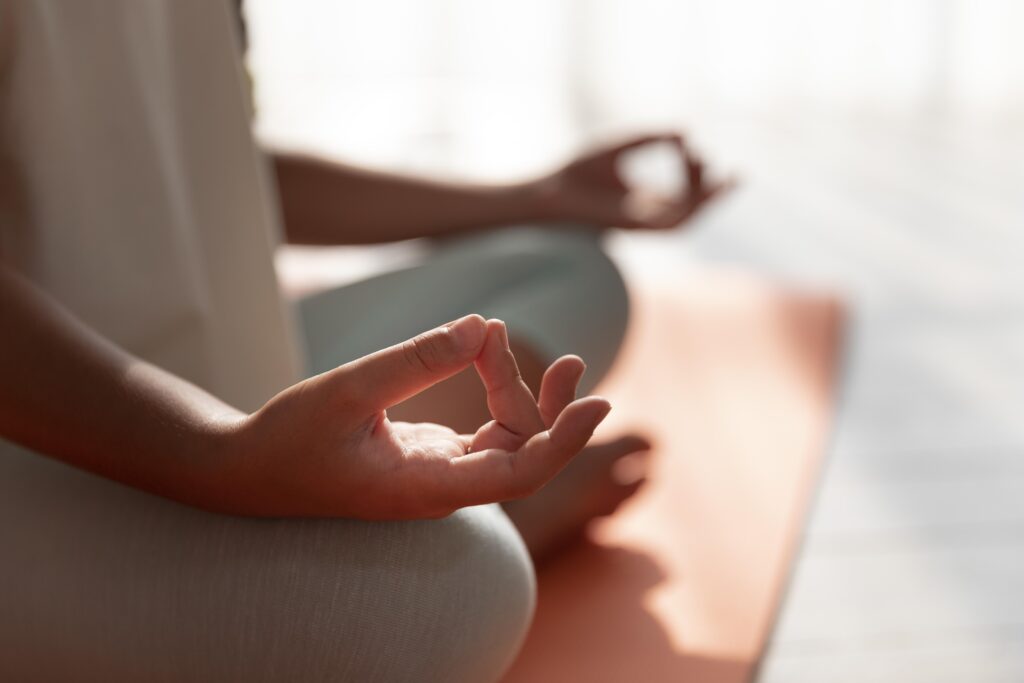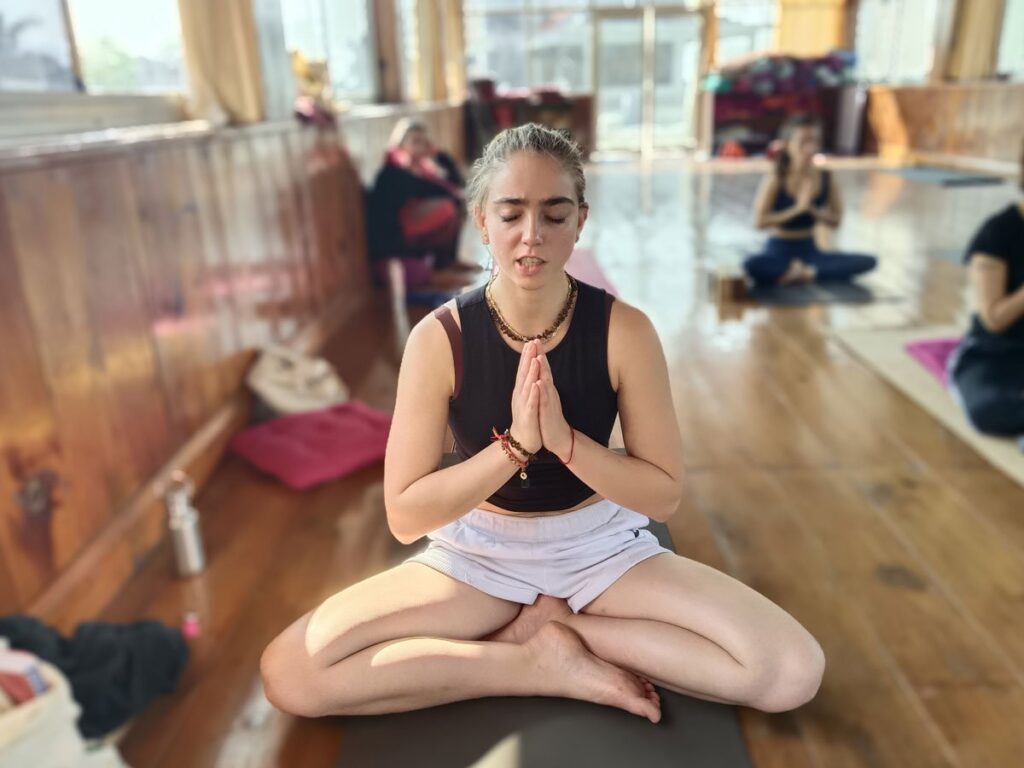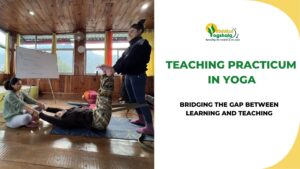In today’s age and fast-paced world, individuals are looking for ways to stay fit and maintain wellness. There are plenty of ways that you can adopt the same, like the traditional way of meditating regularly or the modern technique of practicing breathwork.
Although meditation and breathwork contribute to attaining mindfulness and increasing concentration levels, they are very different from one another. We will highlight the differences between meditation and breathwork and their benefits.
What is Meditation?
To understand meditation: It is a process where one practices mindfulness by sitting and letting all thoughts go away. This helps to calm your mind and relieve stress. Many people meditate to achieve a good mental state and work on their decisions! Meditation is a practice that involves focusing or clearing the mind using psychological and physical techniques!

What Is Breathwork?
Breathwork refers to a wide variety of breathing exercises and techniques that improve the process of breathing. It helps you control breathing and enhances the practitioner’s overall mental, physical, and emotional well-being.
Key Benefits of Meditation
Some individuals ask what the benefits of meditation are, and below, we have laid out some core benefits of meditation!
1. Reduces Memory Loss
Meditation helps to reduce memory loss, focuses on memories, and improves quickness. Meditation is an excellent healing process that will help practitioners to attain peace and remain true to themselves. It has been proven that dementia patients often meditate so that they don’t lose their memories! Thus, there are many benefits of meditation!
2. Focuses on Your Attention-Keeping Ability
Many people have problems concentrating on something at large. Meditation can increase one’s ability to pay attention and focus on something. Thus, meditation is essential to keep focus and not get distracted. This is especially good for students, and therefore one should keep in mind that there are many benefits of meditation for students
3. Improves Health Conditions
Medical conditions that can be worsened by stress should be treated well. With meditation, one can do away with stress, anxiety, and other health conditions like heart disease, Cancer, and high blood pressure. All these problems can be cured by practicing meditation. With meditation, one can avoid negative thoughts and improve one’s health!
4. Generates Kindness
By practicing meditation, one can promote a feeling of kindness and a soft-hearted nature in people. This practice makes you have positive thoughts and feelings. Thus, people who are rude, angry, and frustrated should try meditation!

Tips for Starting a Meditation Practice
- Start with 5 to 10 minutes.
- Try exploring different areas of your home or nature for a meditation spot
- Try different meditation practices to find a good fit
- Learn more about your chosen meditation format
- Connecting and sharing experiences with others who also meditate!
Key Benefits of Breathwork
1. Increases Confidence
Breathwork exercises can help boost your confidence level. A lot of people have no self-confidence, which is why they can’t do many tasks. Thus, with breathwork, these people can enhance their confidence and manage tasks well.
2. Immediate Stress Relief
Breathwork can give you instant stress relief. Breathwork involves changing your breathing patterns, enabling you to eliminate stress and anxiety. Once you practice breathwork, you will feel much better and have open-ended thoughts.
3. Promotes Self – Love
Loving ourselves feels like a difficult task. We end up hating ourselves because of other people putting us down. However, breathwork will help you to love and understand yourself. You can boost a relationship with yourself and pamper yourself with things you’ve always dreamt of!
4. Restructures Sleep Cycle
Social media, stress, and anxiety all affect our sleep schedule. We try to fix the sleep schedule, but something or another always comes in between. With deep breathing, one will overcome this problem and calm your mind!
Also Read: 7 Health Benefits of Meditation Practice
Combining Meditation and Breathwork in Yoga
When one does meditation and breathwork together, it works like magic! Together, these two things can change you in some significant ways!
- Feeling Connected: Meditation and breathwork help you to connect your mind and body. This is very much needed to become a good yoga teacher.
- Understanding yourself: Both meditation and breathwork help you to understand yourself better, like how your body and mind work. This is very helpful when you have to teach yoga to other people!

Breathwork Meditation Exercises
- 4-7-8 breathing: Doing a 4-7-8 breathwork meditation exercise involves inhaling for 4 seconds, holding your breath for 7 seconds, and exhaling for 8 seconds. This should be repeated several times!
- Alternate Nostril Breathing: Alternate nostril breathing covers one nostril and alternates each inhale and exhale. One of these popular exercises is Anulom Vilom.
- Bhramari Pranayama (Bumblebee Breath): This breathing involves breathing deeply and making a high-pitched humming sound while you exhale. The teachers generally advise you to place your index fingers over your ear while you hum.
- Box Breathing: In box breathing, one will inhale for 4 seconds, hold the breath for 4 seconds, exhale for 4 seconds, and then hold your breath again for 4 seconds.
- Diaphragmatic Breathing: This involves breathing while engaging your diaphragm. To practice this kind of breathing, place one hand on your chest and the other hand on your stomach. Take deep breaths, keeping your chest still and allowing the belly to expand fully.
Tips for Starting a Breathwork Practice
- Start Small: begin with short breathwork sessions, for like few minutes, and then gradually increase the duration when you feel comfortable!
- Find a Comfortable Position: One can sit, lie down, or stand to feel relaxed and supportive
- Focus on diaphragmatic breathing: Breathe deeply into your belly, allowing your diaphragm to expand and contract.
- Count Your Breaths: One should use a counting system to help regulate your breath, such as inhaling for 4 seconds, holding for 4 seconds, and exhaling for 4 seconds
- Be Mindful: Pay attention to your physical sensations and emotions during your practice.
- Experiment with Different Techniques: Explore various breathwork styles like box breathing, alternate nostril breathing, or pursed lip breathing to find what works best for you.
Conclusion
For those interested in deepening their yoga journey, consider enrolling in a yoga teacher training program. Rishikul Yogshala, a leading Yoga school in Rishikesh, offers comprehensive courses like the 100 Hour Yoga Teacher Training In Rishikesh, 200 Hrs Yoga TTC In Rishikesh, 300 Hour Yoga Teacher Training In Rishikesh, and 500 Hour Yoga Teacher Training Rishikesh. These programs are designed to help you master your practice and share the transformative power of yoga with others.
FAQs On Meditation & Breathwork in Yoga
1. How do I start meditating?
One can start by taking an online course to learn the basics or even visit a meditation studio near you to learn from someone in person!
2. Do I have to be thoughtless during meditation?
No! Meditation is about quietening the thoughts of the mind; however, being fully thoughtless is something that very few people in the world can achieve. Thoughts will always arise during meditation, and this is normal!
3. Can Children Meditate?
Yes! Of course, children can meditate; however, meditation for children looks different. A wide variety of meditations for children are available through applications, YouTube, and across the web! Meditation for children can be much less intense.
4. How do I change my life with meditation?
One can adopt a daily meditation practice! Daily meditation for 15 minutes or more has been shown to improve memory recall, cognitive performance, compassion, and empathy!
5. What is breathwork in yoga?
Breathwork, or pranayama, in yoga, controls the breath to regulate energy, calm the mind, and enhance overall well-being.
6. Why is breathwork important in yoga?
Breathwork helps synchronize the body and mind, deepens meditation, and also provides a platform for better emotional balance!
7. Can anyone practice breathwork?
Yes! Anyone can practice breathwork, but those with respiratory conditions, heart problems, or pregnancy should avoid it.
8. When is the best time to practice breathwork?
One should practice breathwork early in the morning on an empty stomach. However, it can be practiced anytime in a quiet place!
9. Should I breathe through my nose or mouth?
Most pranayama techniques use nasal breathing, as it filters and regulates airflow.
10. Is breathwork the same as meditation?
No, but it is often used as a preparatory practice for meditation by calming the mind.















